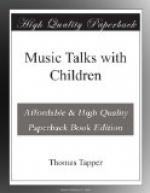And this, likewise, is to be said of all the rest. Our knowledge of History, of Geography, of men of past times, of the boundaries of countries, of cities, of people, of everything, must come from ourselves. And, further yet, according as we have been careful to see in the right way and to do in the right way while we were under instruction in school, so we shall be likely to see and to do when we are not in school, and no longer have some one over us who will kindly and patiently correct our errors, teach us new ways, and give us greater powers. We may, of course, go on learning after our school days are ended; and really much of the best education comes then, if we will immediately set about correcting the faults which we find in ourselves.
Indeed, many men have gained the best part of their education after leaving school, where, perhaps, it was their fortune to stay but a short time.[67] But we must remember that the habits of learning, doing, seeking, are gained in early years, and if they are not gained then they rarely come.
Now, what have we learned about schools and school-tasks? We have learned a little of the purpose which lies in the education we receive; that out of it must come the power to do and to know; that is our own power; not that of any one else. We have seen the usefulness of school-studies, and how practical they are in our daily life.
In all this Talk we have said nothing about Music. If, however, we understand what the other studies mean, what their purpose is, we shall learn something which shall be valuable when we come to study the meaning and purpose of music in schools. That shall be our next Talk.
CHAPTER XXIII.
MUSIC IN SCHOOL.
“Become in early years well-informed
concerning the extent of the
four voices.
“Try, even with a poor voice, to sing at sight without the aid of an instrument; from that your ear will constantly improve. In case, however, that you have a good voice, do not hesitate a moment to cultivate it; and believe, at the same time, that heaven has granted you a valuable gift.”—Robert Schumann.[68]
In the previous Talk we learned two very important facts about school studies. They were these:
I. They are useful.
II. They are useful in proportion
to our own (not to anybody else’s)
real knowledge
of them.
We do not study useless subjects, and it is not from our books, nor from our teacher that we go through life, making our way. In other words, the harder we work, the more independent we become; and the more independent we become, the more power we have to help others.
Now, whatever is true about other school studies is likewise true about music. It is given to children in school because it is useful, and because a child can gain power by learning it. Let us see about this.




